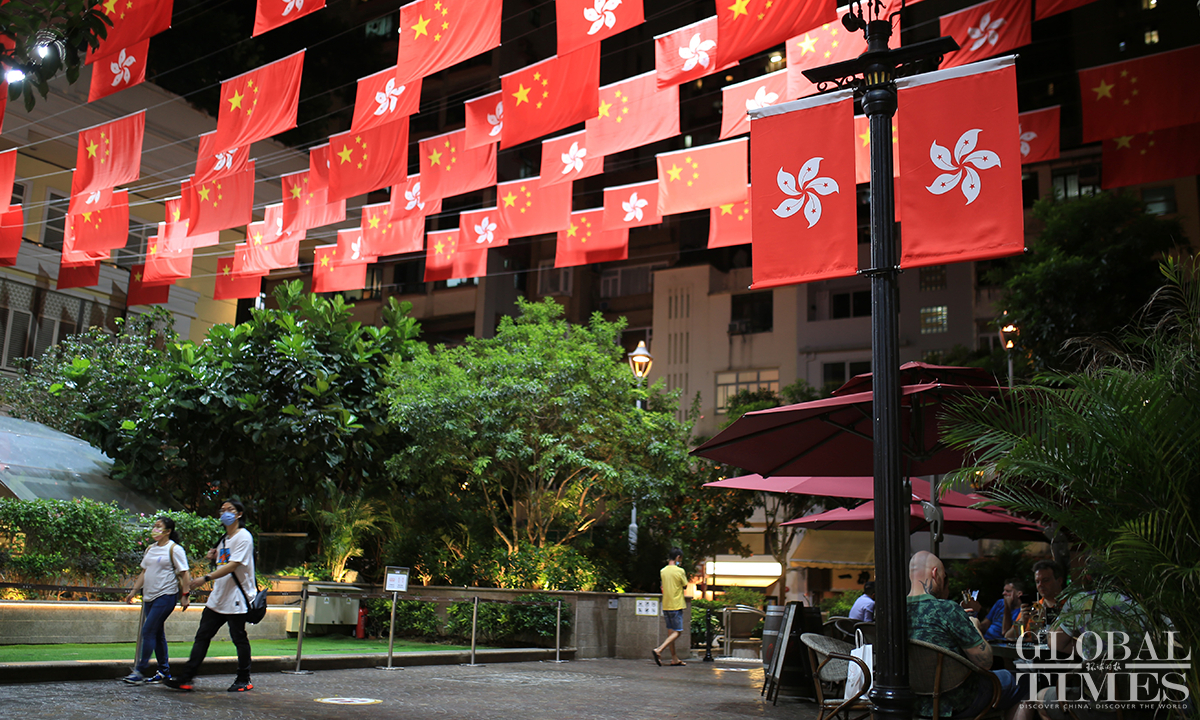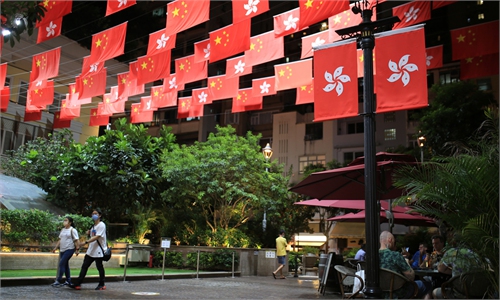Upholding One Country, Two Systems of 'great practical significance' for resolving Taiwan question: experts

Photo: Fan Lingzhi/GT
Officials and experts in both the Chinese mainland and Hong Kong have been studying the spirit of the 20th National Congress of the Communist Party of China (CPC), and a panel discussion held simultaneously in Beijing and Hong Kong on Wednesday focused on the CPC Constitution concerning Hong Kong and Macao affairs, saying that upholding the policy of One Country, Two Systems has practical significance for resolving the Taiwan question in a peaceful way.
During a discussion over making a calendar for introducing One Country, Two Systems and planning for a museum focused on explaining this principle, some experts and officials said the principle serves not only as a guarantee for Hong Kong and Macao but also as a solemn political oath to the world, which has far-reaching significance.
The policy of One Country, Two Systems is a great innovation of socialism with Chinese characteristics. It has proven to be the best institutional arrangement for ensuring sustained prosperity and stability in Hong Kong and Macao after their return to the motherland, said the report presented by Xi Jinping, general secretary of the CPC Central Committee, at the opening of the 20th CPC National Congress on Oct 16.
Tian Feilong, a legal expert at Beihang University in Beijing, told the panel that One Country, Two Systems could be summarized as a peaceful spirit with no cold war mentality, flexibility of using the divergences in two systems to push forward Chinese modernization, and coordinating the country's development.
The report to the 20th National Congress of the CPC said that resolving the Taiwan question and realizing China's complete reunification is, for the Party, a historic mission and an unshakable commitment. And the policies of peaceful reunification and One Country, Two Systems are the best way to realize reunification across the Taiwan Straits; this best serves the interests of Chinese people on both sides of the Straits and the entire Chinese nation.
Jiao Hongchang, professor from the Law School of China University of Political Science and Law, told the panel that "The fundamental political structure of One Country including the bottom-line of constitutional order established by the Constitution and the Basic Law as well as the principle of only patriots governing Hong Kong and Macao remain unchanged." "What changes is specific system optimization and innovation, with the full governance of the central government and high autonomy of the HKSAR government unchanged," he said.
The successful practice of One Country, Two Systems in Hong Kong and Macao also provides a good example for resolving the Taiwan question, and experts called for a special museum to fully elaborate on this principle to the public, which will also demonstrate the central government's determination and confidence in resolving the Taiwan question.
Huang Ping, director of the center for Taiwan, Hong Kong and Macao Studies at the Chinese Academy of Social Sciences, said the report to the Party's congress offers guidelines for ideas and development blueprints, including how to handle issues related to security, as well as internal and external affairs.
"The new amendment to the CPC Constitution [on One Country, Two Systems] uses the wording 'comprehensively, accurately and unswervingly implement [the principle] instead of 'follow', which is a result of serious reflection by decision-makers," Huang said.
This also summarized the practice of the principle over the past 25 years, especially as Hong Kong society was heavily affected by challenges in 2019, he said.


